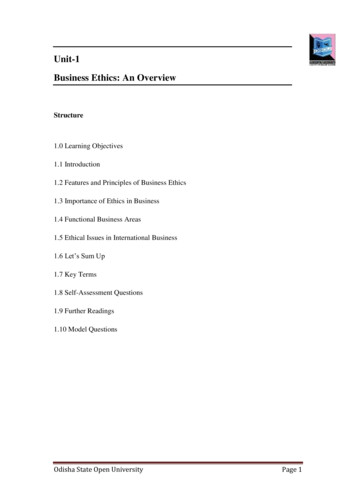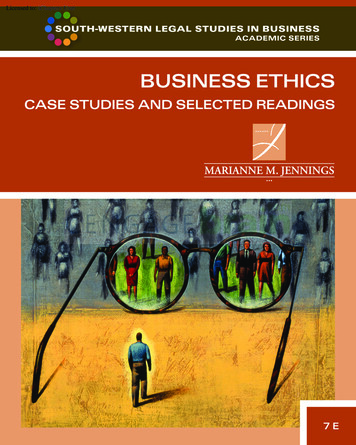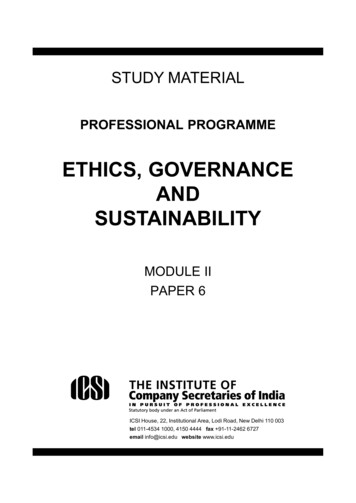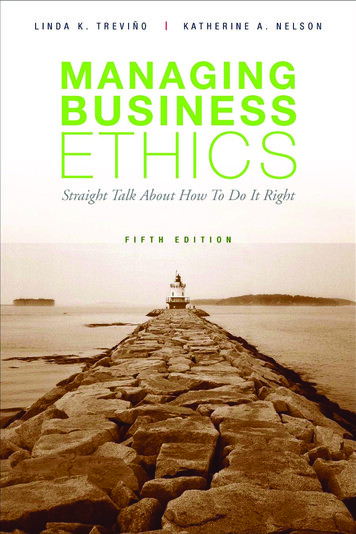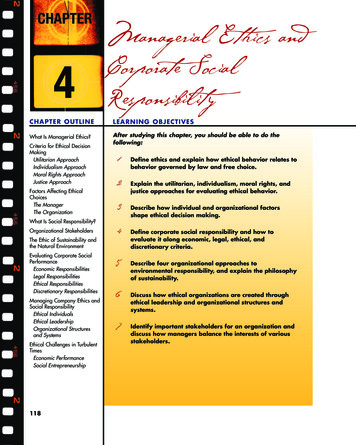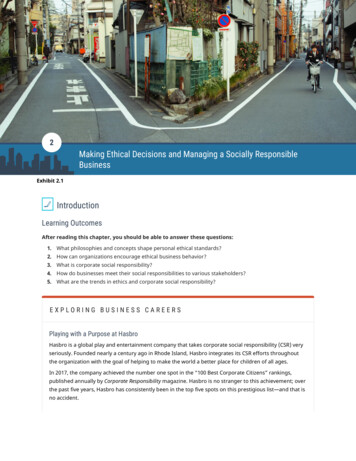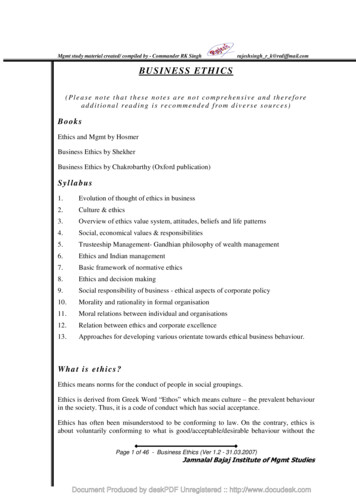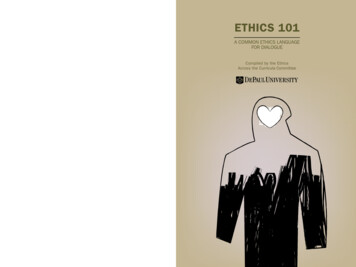
Transcription
ETHICS 101A COMMON ETHICS LANGUAGEFOR DIALOGUECompiled by the EthicsAcross the Curricula CommitteeDePaul UniversityInstitute for Business & Professional Ethics1 E. Jackson Blvd, Ste 7000Chicago, IL 60604http://commerce.depaul.edu/ethicsbf 208592
ETHICS 101A COMMON ETHICS LANGUAGEFOR DIALOGUECompiled by the EthicsAcross the Curricula Committee 2007 IBPE. All Rights ReservedChaired by Patricia Werhane, Director, Institute for Business & ProfessionalEthics, DePaul University. A subcommittee of the Ethics Across the CurriculaCommittee created this document. The members include: Andrew Gold,Professor, College of Law; Laura Hartman, AVP & Professor of BusinessEthics, Department of Management; Karyn Holm, Professor, Departmentof Nursing; Scott Paeth, Asst. Professor, Religious Studies Department;Charles Strain, Associate Vice President of Academic Affairs; Marco Tavanti,Asst. Professor, Public Services Graduate Program; David Wellman, Asst.Professor, Religious Studies Department. This guide draws from variousresources prepared by others including copyrighted materials reprintedwith the permission of the Markkula Center for a Applied Ethics at SantaClara University (www.scu.edu/ethics), from Larry Hinman, Ethics: APluralistic Approach to Moral Theory, 3rd edition (Belmont CA: ThomsonLearning, 2003), from Marco Tavanti, “Thinking Ethically” (unpublished),David Ozar, “A Model for Ethical Decision-Making.” (unpublished).
Ethics AcrossThe Curricula At DepaulA Common Ethics Language For DialogueAs part of DePaul’s VISION twenty12, in particular Objective1e: “Provide opportunities for all students to learn ethicalsystems and demonstrate ethical practice,” and in responseto the ever-increasing demand for more ethical behavior onthe part of business, the professions, in politics, and in publiclife, the Institute for Business and Professional Ethicshas been given the opportunity to coordinate, encourage,and enable the teaching of ethics across the curriculaat DePaul, in every discipline and every school. This is nota mandate to require ethics modules in every course,and how ethics is presented in each discipline will, of course,be quite different, depending on the area of study and focus.Thus we have titled this initiative, Ethics Across the Curricula.Part of this initiative is to develop a common glossary orlanguage for talking about ethics at DePaul, and to sharesome commonly used tools in thinking about and teachingethics in various disciplines. This is a a living document.We encourage all faculty to discuss, critique, and amendthis initial formulation.
Table of ContentsIntroductionDePaul/Vincentian values as thecore unity in a diverse university1Part ICan Ethics be Taught to Adults?3Part IIWhat Ethics is Not4Part IIIBasic Distinctions5Part IVTraditions of Ethical Reasoning8Part IVSuggested Models for CriticalEthcal Reasoningand Decision-Making13Glossary ofCommonly Used Terms18Appendix IWhat do we expect fromour courses and our students?23Appendix IIThe completeHermeneutical Circle25
IntroductionDePaul University is a diverse institution. Its student body, administration,and faculty come from all parts of theworld and from a number of religiousand ethnic communities. What unifiesDePaul is its commitment to Vincentianvalues. These values derive from theteachings and practices of St. Vincentde Paul. These are core values, thatis, global, shared commitments of allcommunities at DePaul.The distinguishing marks of DePaul’smission are clearly stated on its web site:By reason of its Catholic character, DePaulstrives to bring the light of Catholic faithand the treasures of knowledge into a mutually challenging and supportive relationship.It accepts as its corporate responsibilityto remain faithful to the Catholic messagedrawn from authentic religious sources bothtraditional and contemporary. In particular,it encourages theological learning andscholarship; in all academic disciplines itendorses critical moral thinking and scholarship founded on moral principles whichembody religious values and the highestideals of our society.On the personal level, DePaul respects thereligiously pluralistic composition of its members and endorses the interplay of diversevalue systems beneficial to intellectual inquiry.Academic freedom is guaranteed both asan integral part of the university’s scholarlyand religious heritage, and as an essentialcondition of effective inquiry and instruction.The university derives its title and fundamentalmission from St. Vincent de Paul, thefounder of the Congregation of the Mission,a religious community whose members,Vincentians, established and continue tosponsor DePaul. Motivated by the example of St. Vincent,who instilled a love of God by leading hiscontemporaries in serving urgent humanneeds, the DePaul community is aboveall characterized by ennobling the God-givendignity of each person. This religious personalism is manifested by the members of theDePaul community in a sensitivity to andcare for the needs of each other and of thoseser ved, with a special concern for thedeprived members of society. DePaul University emphasizes the development of a fullrange of human capabilities and appreciationof higher education as a means to engagecultural, social, religious, and ethical valuesin service to others.As an urban university, DePaul is deeplyinvolved in the life of a community which israpidly becoming global, and is interconnected with it. DePaul both draws from thecultural and professional riches of thiscommunity and responds to its needs througheducational and public service programs,by providing leadership in various professions,the performing arts, and civic endeavorsand in assisting the community in findingsolutions to its problems.(www.depaul.edu/about/mission/,accessed March 5, 2007)Because of these shared commitments,the University Committee on EthicsAcross the Curricula, mandated by VisionTwenty12, is trying to bring togetherthe diverse communities at DePaul, notthrough an edict but rather with anaim to develop a common vocabulary withwhich we can all talk about ethics inour classes and student dialogues. Werecognize that each school or department at DePaul may have its own sharedmission and common vision for itsendeavors. Thus, we are not seekingabsolute agreement, but rather consensuson a common dialogue that we canshare in teaching ethics. This is the firsteffort at this enterprise. As such, this is aworking and living document upon whichwe can build a common vocabulary, towhich we invite faculty input and critique.
Part I: Can Ethics Be Taught to AdultsPart II: What Ethics Is NotThe issue is an old one. Almost 2500 yearsdevelopment. One of the most crucialago, the philosopher Socrates debatedfactors, [Lawrence] Kohlberg found,the question with his fellow Athenians.is education. Kohlberg discovered thatSocrates’ position was clear: Ethics consistswhen his subjects took courses in ethicsof knowing what we oughtand these courses chalto do, and such knowllenged them to look at a commonedge can be taught. Mostissues from a universalpsychologists today wouldpoint of view, theyvocabulary withagree with Socrates. In antended to move upwardwhich we can alloverview of contempothrough the levels. Thistalkaboutethics rary research in the fieldfinding, as [James] Restof moral development,points out, has beenpsychologist James Restrepeatedly supportedsummarized the major findings as follows:by other researchers. (Velasquez, Andre,Shanks, S.J., and Meyer, 1987 from the Dramatic changes occur in young adultsMarkkula Center)in their 20s and 30s, in terms of the Ethics is not the same as feelings. Ethics is not merely following culturFeelings provide important informationally accepted norms. Some culturesfor our ethical choices. Some peopleare quite ethical, but others becomehave highly developed habits that makecorrupt-or blind-to certain ethicalthem feel bad whenconcerns (as the Unitedthey do somethingStates was to slaveryEthics consists ofwrong, but manybefore the Civil War).people feel good even“When in Rome, do asknowing what wethough they are doingthe Romans do” is notought to do something wrong.a satisfactory ethicalAnd often our feelstandard. On the otherings will tell us it ishand, it is advisableuncomfortable to do the right thing ifto also be aware of and sensitive toit is hard.cultural norms when entering another’senvironment. Some theorists would Ethics is not merely religion, althoughcontend that, as long as those normsmost if not all religions present a setdo not violate one’s own fundamentalof ethical standards. Many people areprinciples, imposing one’s own stannot religious, but ethics applies todards on other’s cultures may crosseveryone. Most religions do advocateunderlying principles of autonomyhigh ethical standards but sometimesand dignity.do not address all the types of problemsbasic problem-solving strategies theyuse to deal with ethical issues. These changes are linked to fundamental changes in how a person perceivessociety and his or her role in society. The extent to which change occursis associated with the number ofyears of formal education (college orprofessional school). Deliberate educational attempts(formal curriculum) to influenceawareness of moral problems and toinfluence the reasoning or judgmentprocess have been demonstratedto be effective. Studies indicate that a person's behavioris influenced by his or her moralperception and moral judgments.Many factors can stimulate a person'sgrowth through the three levels of moral James Rest’s model outline for teachingethics to adults is the following: Raise ethical issues through casestudies [Adults relate and rememberparticulars and generalize fromthem rather than the reverse.] Develop and teach a process ofreasoning—a decision model thatcan be used with the examples. Develop moral imagination. Engage in iterative practices ofapplying the reasoning process toparticular situations. As a teacher, also be a role model forwhat you teach. If possible, provide internships so thatstudents can “practice” before gettingreal jobs.we face. Ethics is not merely following the law.A good system of law does incorporatemany ethical standards, but law candeviate from what is ethical. Lawcan become ethically corrupt, as sometotalitarian regimes have made it.Law can be a function of power aloneand designed to serve the interests ofnarrow groups. Law may have a difficulttime designing or enforcing standardsin some important areas, and may beslow to address new problems. Ethics is not identified with science.Social and natural science can provideimportant data to help us make betterethical choices. But science alonedoes not tell us what we ought to do.Science may provide an explanationfor what humans are like. But ethicsprovides reasons for how humansought to act. And just because something is scientifically or technologicallypossible, it may not be ethical to do it.(Markkula Center, 2007)James Rest’s [optimistic] conclusion:Behavior can be changed! (Rest, 1998)
Part III: Basic DistinctionsValue System“Value System” refers to how anThe term “value” implies the (conscious)individual or a group of individualsprioritizing of different behavioralorganize their ethical or ideologicalalternatives or standardsvalues. These maythat are perceived to besimply be values thatpossible, worthwhile,Ethics is the reflecemerge from, or areor esteemed for the indibuilt into, a culture ortiveconsiderationvidual, an institution orof our moral beliefs religious system. Ora nation. Thus values canvalues may be standardsbe espoused and apply toand practices.or principles developedgroups (such as ‘Americanor created by individualsvalues’) or to individuals.or organizations. A wellFor example, religious values are bothdefined value system is a moral code.group-related and individually espoused.One or more people can hold a valueValues can function both as processessystem. A communal value system is heldand goals. For example, democracy isby and applied to a community/group/both a process, and a goal. Values cansociety. Some communal value systemsbe instrumental, that is, what is thoughtmay take the form of legal codes orto be worthwhile in achieving otherlaw. A value system may consist of threethings. But ordinarily values are thoughtvalue cate-gories: 1) Core Values, whichto be intrinsic, that is, those behaviors,prescribe the attitude and character ofstandards, and principles that we findan individual, a religion, an organizationworthwhile, worth defending, andor a system, 2) Protected Values, thoseworthy of our esteem for their own sakes.protected through rules, accreditations,For example, often we hold liberty tostandards and certifications, and/orbe a value worth defending for its own3) Created Values, the values that wesake, whether or not defending libertydevelop and expect from each other,produces positive consequences in everyfrom groups, or the organizations orinstance. Values also function teleologicallypolitical systems to which we belong.as ends or purposes of human activities,usually some form of human well-beingor flourishing. (Hollar, 1997, 592)Each individual has certain underlyingvalues that contribute to their valuesystem. Integrity in the application of a“value” ensures its continuity and thiscontinuity separates a value from beliefs,opinion and ideas.Values Morality“Morality” refers to the beliefs and practices about good and evil by means ofwhich we guide our behavior. Ethics,in contrast, is the reflective considerationand evaluation of our moral beliefsand practices.Common Morality orCommon Sense Morality“The moral system that thoughtfulpeople use, usually implicitly, whenthey make moral decisions and judgments.” (Gert, 2004, 2) One formof these may be thought of as negativemoral minimums: Do not kill Do not cause pain Do not disable Do not deprive of freedom Do not deprive of pleasure Do not deceive Keep your promises Do not cheatMoral CodesMoral codes are often complex definitionsof right and wrong that are based uponwell-defined value systems. They dictateproper personal conduct. Although somepeople might think of moral codes assimple and “universal”, they are oftencontroversial due to one’s religious andcultural values. Sometimes, moralcodes give way to legal codes, whichcouple penalties or corrective actionswith particular practices. Examples ofmoral codes include the Golden Rule;the Noble Eightfold Path of Buddhism;the ten commandments of Judaism,Christianity, and Islam (please refer to theMoral Codes document available onBlackboard for additional information).EthicsThe explicit reflection on and evaluationof moral beliefs and practices. The difference between ethics and morality issimilar to the difference between musicology and music. Ethics is a consciousstepping back and reflecting on morality,just as musicology is a conscious reflectionon music.Ethical CodesEthical codes also referred as “codes ofconduct,” are usually codes adopted bya profession, an organization or by agovernmental or quasi-governmentalorgan to regulate the behavior of thoseworking in the organization or those whoare members of that profession. Somecodes of ethics are promulgated by the(quasi-)governmental agency responsible
Part IV: Traditions of Ethical Reasoningfor licensing a profession. Violations ofthese codes may be subject to administrative (e.g., loss of license), civil or penalremedies, or simply the loss of membership in the organization. Other codesare merely advisory and there are noprescribed remedies for violationsor even procedures for determiningwhether a violation even occurred.The subject matter of ethics is oftenfurther articulated in terms of: Meta-ethics: the study of ethics,values, and belief systems; Normative ethics: the formulation ofprescriptions and proscriptions aboutwhat we ought and ought not to do,all things considered; Practical or applied ethics: thenormative practice of ethics inparticular disciplines, professions,or organizations; Social ethics: “assumes that humanactivity has both individual and socialdimensions and that both are part ofethics . In Judeo-Christian ethics theterm implies a critical reflection onsocial and political aspects of moralityas opposed to strictly personal orinterpersonal aspects.”(Hollar, 1997, 590-1) Descriptive ethics: factual descriptionsand explanations of moral behaviorand beliefs. Professional ethics: an inquiryinto professional conduct. It is partof applied ethics but considersprofessional codes and obligations.Professional ethics deal with issuesof ethical conduct within the profession and how these codes of conductrelate to the greater goals of society.Principle of SolidarityVincent’s preferential and evangelicaloption for the poor is both a humanThe “Four - S” Vincentianistic and faith based perspective. ForEthics PrinciplesVincent, the poor areSt. Vincent de Paul“our lords and masters”(1581–1660) is wellThere are variousand they are “the placeknown for his contribuapproaches andwhere we meet Christtion to charitable andand find salvation.” Intraditions tosocial causes. He did notother words, the firstethical thinkingspecifically write aboutVincentian ethicalhis ethics and leadershipprinciple suggests thatpractices. However, byactive local/internationalexamining his writings, life examplessolidarity for poverty reduction is a mustand commitment to the poor, it isfor Vincentian leaders. This principle ispossible to frame a Vincentian ethicsclosely related to the Vincentian leadershipfor personal and organizational serviceorientation identified as “SERVICE.”oriented leadership. The competencies,Principle of Synchronicityvalues and leadership models thatemerged from the research of theVincent knew that organized charityWilliam and Mary Pat Gannon Hay–would not be effective unless diverseVincent de Paul Leadership Projectpeople, organizations and institutions(DLP) provide a basis for the formulationwork in partnerships and collaborations.of a Vincentian ethical paradigmThe effectiveness, quality and sustainembedded in Catholic social teachingability of the services delivered depend onthat includes a preferential option forthe leader’s vision and faith in the divinethe poor, a particular attention to theprovidence and on his/her innovativeperson, and the creation and managestrategies to engage people to collaboratement of sustainable and effectivetoward the same mission. This principle isorganizations oriented toward serviceclosely related to the Vincentian leadershipand social change. Building on previousorientation identified as “MISSION.”studies in this field, (Bowes, 1998,Mousin, 2005, Rybolt, 2005, Tavanti,2006,) we can summarize the ethicalparadigm inspired by St. Vincentde Paul into the 4S Principles forVincentian EthicsVincentian Ethics:
Principle of SubsidiarityVincent’s emphasis on the dignity of thehuman individual transpires from manyexamples of his personal dedication tothe poor and his managerial style. Centralleadership authority in organizationsshould have a subsidiary function,performing only those tasks which cannotbe performed effectively at a more immediate or local level. In terms of “positivesubsidiarity,” institutions are ethicallycalled to create the social conditionsnecessary to the full development of theindividual, such as the right to work,decent housing, health care, etc. Thisprinciple, summarizes Vincent’s firmconviction that organizations, includingthe Catholic Church, should be at theservice of the human person. In CatholicSocial Teaching, ‘subsidiarity’ sometimesrefers to decentralizing decision-makingauthority and responsibility to subsidiarygroups whenever this serves the commongood. In a more secular modern context,it is connected with concepts of participatory democracy and limited government.At DePaul University, the concept oftenreferred to as ‘personalism,’ is a reflectionof the subsidiary principle. This principleis closely related to the Vincentian leadership orientation identified as “PEOPLE.”Principle of SustainabilityVincent committed his life not only toserving the poor directly, but alsoto creating and managing capable andsustained institutions at the serviceof the poor. The institutionalization andsustainability of a project are thereforeessential and integral elements in Vincentian leadership ethics. Vincent’s phrase,“It is not enough to do good, it must bedone well” translates here as “It is notenough to develop servant leaders unlesswe also engage in the development ofservant structures.” Sustainability refersto personal and organizational commitment to provide the best outcomes forthe human and natural environmentsboth for immediate and future needs.This principle is closely related to theVincentian leadership orientationidentified as “TASKS.”Classical Ethics TraditionsThere are various classical approaches toethical thinking in leadership practicesand decision making. These have bothsecular and religious roots. Each is tohelp us determine what standards ofbehavior can be considered ethical.Although limited, each approach givesus important information with which todetermine what is ethical in a particularcircumstance. Much more often than not,the different approaches do lead to similaranswers. Some of the most commonapproaches include the following:Virtue Approach Focuses on attitudes, dispositions, orcharacter traits that enable us to beand to act in ways that develop ourhuman potential. Examples: honesty, courage, faithfulness,trustworthiness, integrity, etc. The principle states: “What is ethicalis that which develops moral virtuesin ourselves and in our communities.”Utilitarian Approach Focuses on the consequences thatactions or policies have on the wellbeing (“utility”) of all persons who aredirectly or indirectly affected by theaction or policy. The principle states: “Of any twoactions, the most ethical one willproduce the greatest balance of benefitsover harms for the greatest number.”Deontological Approach Often identified with Immanuel Kant,the focus is on one’s duties and unconditional obligations. For Kant, thereis a single moral obligation, which hecalled the “Categorical Imperative.”It applies to all and only rational agents. Kant’s first principle states, “Act in sucha way that your actions could beformulated as a law applying universally to everyone.” Kant’s second principle states, inaddition to the first: “Act in such away that you treat every humanbeing as an end, not as a means.”Rights Approach Identifies certain interests or activitiesthat our behavior must respect, especially those areas of our lives that are ofsuch value to us that they meritprotection from others. The principle states: Each person has afundamental right to be respected andtreated as a free and equal rationalperson capable of making his or herown decisions. This implies other rights (e.g., privacyfree consent, freedom of conscience,etc.) that must be protected if a personis to have the freedom to direct hisor her own life. This also implies that each of hasduties to respect, equally, the rights ofeveryone else. Tom Donaldson frames commonmorality internationally in terms ofbasic minimum universal rights: Right not to be tortured Right to a fair trial Right to equal opportunity Right to security Right to free speech and association Right to minimal education Right to political participation 10
Right to subsistence Right to freedom ofphysical movement Right to own property(Donaldson, 1990)Fairness (or Justice) Approach Fairness requires consistency in theway people are treated. Distributive justice focuses on howfairly or unfairly our actions distributebenefits and burdens among themembers of a group. The principle states: “Treat peopleas equals unless there are morallyrelevant differences between them.”11Communitarian Approach Espoused by Amatai Etzioni,this approach focuses on communalresponsibilities rather than individualrights. The communitarians defendthe primacy of the common good,stressing the importance of commitment and collaboration as thetouchstones of any society’s moralvalues. Conscience is not an individualcompass, but all the ways that acommunity makes public its principlesand standards. Etzioni attempts toachieve balance with his contentionthat the primary values are moralorder and autonomy.Common Good Approach Presents a vision of society as a community whose members are joined in ashared pursuit of values and goals theyhold in common.Ethics of Care Approach Assumes that ethics is formed in andthrough our relationships with others.Reflection on principles is secondaryto the attentiveness and care with whichwe nurture relationships. The community is comprised of individuals whose own good is inextricablybound to the good of the whole. An ethics of care approach is emphasizedin those traditions which see compassionas central to interpersonal flourishing. The principle states: “What is ethicalis that which advances the commongood.” (Tavanti, 2007; MarkkulaCenter, 2007) The principle states: “What is ethicalis that which fosters the flourishing ofrelationships and of each living beingwithin a given relationship.Ethics and Law There is the set of ethical challengeswhich face lawyers and other participants in the legal system — theseconcern the morality/ethics of the lawas it is applied, especially in cases ofdiscretion where lawyers/judges haveseveral choices legally available. Thiswould include issues raised by professional codes of ethics, but also ethics ina broader sense.Other ApproachesThere are many other ways to thinkabout ethics and moral reasoningincluding: An Ecological Approach,Feminism, Social ethics, ProfessionalEthics Approach, Applied or PracticalEthics, Research Ethics Approach,Race Theory, Queer Theory, and others. There is also a more general concern,which is with the indirect ethicaleffects of a particular set of legal rulesas a guide to individual behavior.The legal rules selected may affect thechoices people make in their daily lives.Claims that the well-being of Earth isprimary, and human well-being is derivative. Ecological ethics is becoming acentral source of ethical discourse andanalysis, and provides a strong corrective to anthropocentric approaches toethics. The principle states: “What isethical is what preserves the integrity ofthe ecosphere.” In addition, there is the concern ifone considers following a legal rule ina particular context to be unethical. Finally, one could consider if and whenethical considerations should be incorporated into substantive legal ruleswhere the two diverge.For example:Ecological ApproachWe invite definitions and discussion ofthese and other approaches.12
Part V: Suggested Models For CriticalEthical Reasoning And Decision-MakingAny model of decision-making is necesStep 2Get the Factssarily an oversimplification, because itseparates out reflective activities that we What are the relevant facts of the case?actually perform all mixed together, andWhat facts are unknown?identifies as separate What individuals“steps” of the decisionand groups have anWhat models formaking process activitiesimportant stake in thethat are highly interdeethical decisionoutcome? Do somependent in actual ethicalmaking arehave a greater stakereflection. In addition,available to us?because they have ain our ordinary ethicalspecial need or becausereflection, we do notwe have special oblicompletely finish onegations to them?step before beginning on another. What are the options for acting?Instead we move back and forthHave all the relevant persons andbetween the first four steps, learngroups been consulted? If you showeding from one of them that we haven’tyour list of options to someone youadequately answered another, and gatherrespect, what would that person say?ing data from one of them that provesinformative for another, and so on. (OzarStep 32007) With that precaution in mind,Evaluate Alternative Actions Fromwe present several models for ethicalVarious Ethical Perspectivesdecision-making. Which option will produce the mostgood and do the least harm?Markkula Center’s Framework13for Ethical Decision-Making1Utilitarian ApproachStep 1Recognize an Ethical Issue Is there something wrong personally,interpersonally, or socially? Couldthe conflict, the situation, or the decision be damaging to people or tothe community?The ethical action is the one that willproduce the greatest balance of benefitsover harms. Does the issue go beyond legal or institutional concerns? What does it do topeople, who have dignity, rights, andhopes for a better life together?The ethical action is the one that mostdutifully respects the rights of all affected. Even if not everyone gets all theywant, will everyone’s rights anddignity still be respected?Rights Approach Which option is fair to all those whoaffect and are affected by the action?Fairness or Justice ApproachThe ethical action is the one that treatspeople equally, or if unequally, thattreats people proportionately and fairly. Which option would help all participate more fully in the life we share asa family, community, and society?Common Good ApproachThe ethical action is the one thatcontributes most to the achievement ofa quality common life together. Would you want to become the sortof person who acts this way (e.g., aperson of courage or compassion)?Virtue ApproachThe ethical action is the one thatembodies the habits and values ofhumans at their best.Step 4Make a Decision and Test It Considering all these perspectives,which of the options is the right orbest thing to do? If you told someone you respect whyyou chose this option, what wouldthat person say? If you had to explainyour decision on television, wouldyou be comfortable doing so?Step 5Act, Then Reflect on the Decision Later Implement your decision. How did itturn out for all concerned? If youhad it to do over again, what wo
ETHICS 101 A COMMON ETHICS LANGUAGE FOR DIALOGUE Compiled by the Ethics Across the Curricula Committee Chaired by Patricia Werhane, Director, Institute for Business & Professional Ethics, DePaul University. A subcommittee of the Ethics Across the Curricula Committee

